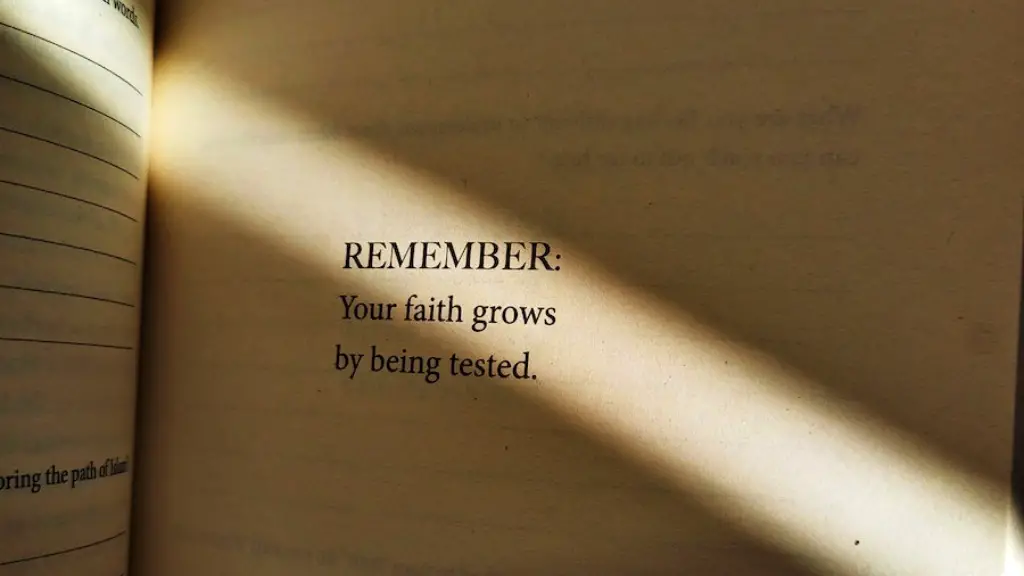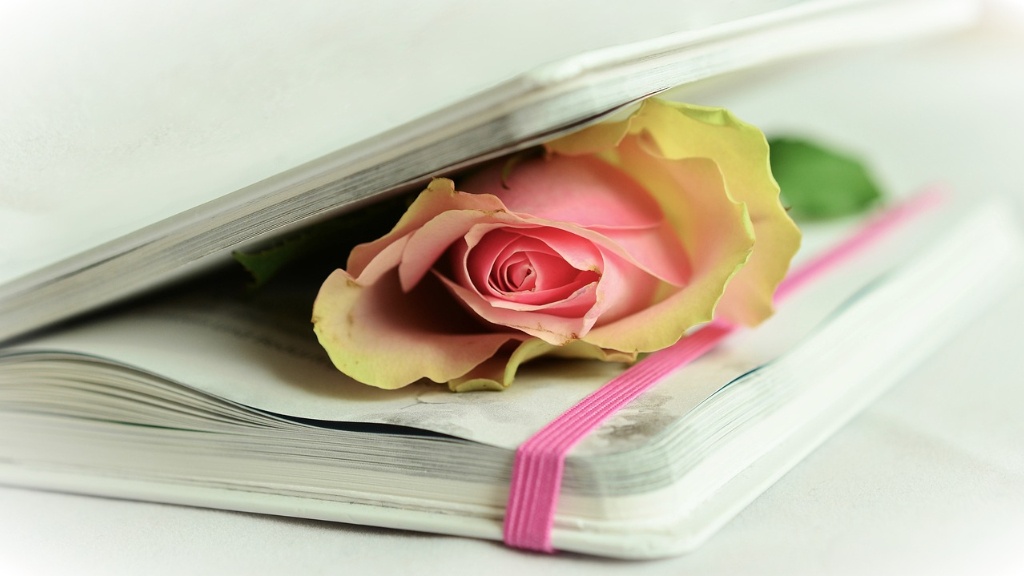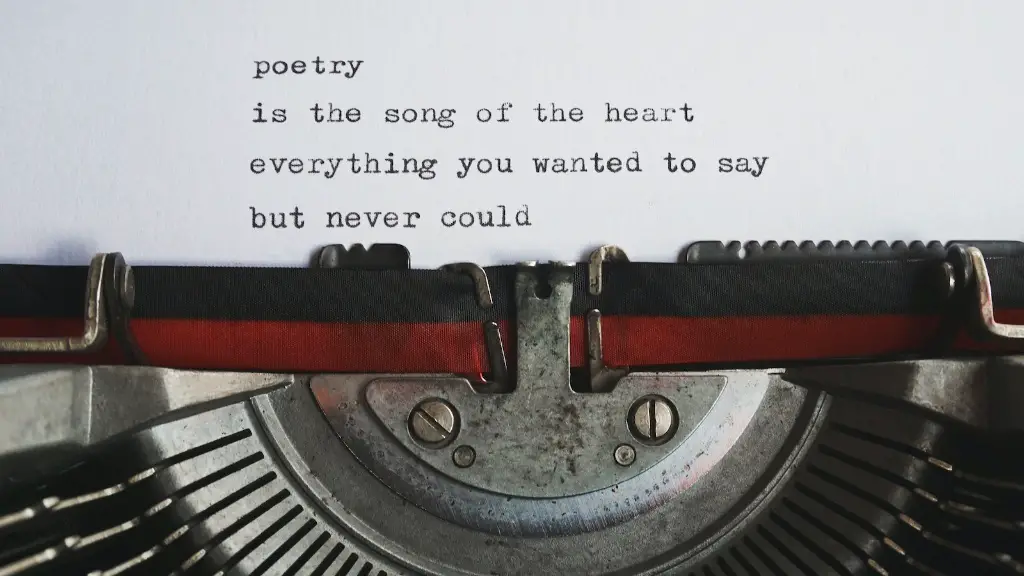Poetry is often touted as the highest form of literature, and can be a powerful way to convey emotion and insights. But is it really? For some, poetry can be an effective artistic statement, but for others, it can be an exercise in futility. Here are some reasons why poetry may not always be the best choice for wordsmiths.
The main reason is that poetry can be very abstract and, to some extent, subjective. While many people can appreciate and understand a poem’s message, they may not necessarily agree with it. For example, a poem focusing on a dark subject may be interpreted as beautiful and inspiring by one person, while another may find it distasteful and offensive. This lack of consensus makes it difficult to classify poems as either successful or unsuccessful.
Furthermore, poetry can also be difficult to interpret due to its often unorthodox structure and syntax. Rather than using straightforward language, poetic devices such as rhymes, allusions, and metaphors can make it difficult for readers to decipher the poem’s meaning. Even experienced readers can find themselves scratching their heads in confusion, as the interpretation of poetic imagery is often heavily reliant on personal experiences and psychological background.
In addition, the use of overly complicated language and poetic devices can often lead to poetry becoming too esoteric for its own good. Many readers will simply become too frustrated trying to understand the poem and, in turn, give up. This issue is especially pronounced in modern poetry, where attempts to push boundaries and innovate can often be counter-productive.
To top it off, due to its often emotive nature, poetry can often be seen as an indulgence. For example, many of the greatest works of poetry focus on topics of death, love and religion, which can be considered to be too niche by those not moved by them. In some cases, poems can lack any semblance of realism, conveying messages without any realistic grounding. Thus, poetry can often be seen as a tired exercise in futility.
Nature of Writing
One major factor to consider in why poetry is bad is the nature of writing. As mentioned previously, poetry is often seen as an exercise in subjectivity. While that may be acceptable in literature or essays, it can be a double book for poetry due to its artistic nature. Writers who try to express an idea in a poetic form often find it difficult to break away from conventional ideas and conventions, making them more likely to cite cliché statements or distribute unoriginal content.
In addition, when wordsmiths try to explain a certain concept in a poetic way, they face the issue of having to sacrifice something in order to fit the poem’s structure or rhyme scheme. This often leads to important concepts or details being cut out or simplified, resulting in a poem that may lack the clarity or complexity that the writer originally intended.
Obscurity
Another point to consider is the obscurity of poetry. While the aforementioned subjectivity of meaning can arguably provide a degree of aesthetic value, it can also be a major hindrance. In some cases, poetic works can be so obtuse that readers may simply give up and relegate them to being most worthy of being forgotten. Furthermore, due to their often abstract and metaphorical nature, many poetic works are simply not accessible to everybody, especially those who are not already familiar with the poem’s subject matter.
For example, a poem focusing on the denizens of a certain era or culture can easily become irrelevant if readers do not have sufficient knowledge of the period or people in question. Moreover, certain niche topics, such as topics concerning political systems, may be too complex to express clearly and concisely in a poem. In either case, the lack of clarity can lead to a poor reception among readers.
Subjectivity
Another major reason why poetry can be seen as bad is due to its subjectivity. Since poetry is often seen as an exercise in creative expression, writers may be too focused on conveying their own views and ideas rather than attempting to convey a meaningful message to their readers. Furthermore, due to its reliance on personal interpretations, the success of a poem may ultimately depend on how readers view it rather than how well it was written.
Moreover, when readers are expected to interpret a work of art in a certain way, it can lead to confusion and misinterpretations. This is especially problematic for poems that contain important messages, as readers may focus more on the author’s individual feelings rather than the overall message, leading to an overall misunderstanding.
Time and Effort
Lastly, the amount of time and effort required to write a successful poem should not be underestimated. Crafting a poem can be a daunting task, and the process can often be both lengthy and arduous. Furthermore, the need to convey a certain message in an economical amount of words can prove difficult, as writers may find it hard to condense various ideas into a poem without sacrificing its poetic quality.
In addition to this, the need to adhere to a certain style or rhyme scheme can also prove difficult, as some words or phrases may not always fit with the poem’s overall message or metre. This issue can be further compounded by the need to ensure that the poem’s message is conveyed in a clear and effective manner to readers, as this can be a challenge for even experienced writers.
Imitation
Imitation can also be a problem when it comes to poetry. Due to the subjective and abstract nature of poems, many readers may expect greater creativity from the poem. Unfortunately, this can lead to writers succumbing to the temptation of plagiarism or copying the style of a more successful poet.
Moreover, this plagiarism can come in the form of ideas, not just style. Writers may find themselves heavily influenced by other works, which can lead to their own work becoming more of an homage than a creative work of art. This can damage their reputation and make them less likely to attract readers.
Lack of Clarity
Furthermore, many writers may struggle to make their poem’s message clear, resulting in a lack of clarity in the poem’s language. This can be a major issue, as readers will not be able to absorb the poem’s message as intended. As a result, the poem may come across as confusing or overly obtuse, leading to a poor reception from readers.
In addition, due to the subjective nature of poetry, the lack of clarity can be a major issue. Many readers may find themselves struggling to decipher the poem’s symbolism or metaphors, rendering it ultimately useless to most readers.
Lack of Appreciation
Finally, some readers may simply not appreciate poetry. This is particularly true for those who do not read literature regularly and struggle to comprehend poetic devices. Furthermore, since poetry can be seen as an indulgence, some readers may simply not be moved by the poem’s message and view it as a pointless exercise.
Moreover, those who do understand poetry may simply not enjoy the poem due to its subject matter. For example, a poem focusing on a dark or morbid subject may not be seen as worthy of attention by those who view life in a more optimistic light.
Economic Impacts
Economic factors can also influence the quality of poetry. Writing poetry requires time and effort and is often a difficult task. Hence, in order to make it profitable, a certain amount of success is required. But success is impossible if a poem does not appeal to the majority of readers, as people are unlikely to purchase a poem that does not move them.
In addition, the majority of poems are not widely published. This may be due to a lack of market confidence, as editors may view certain poems as too obscure or too outlandish to warrant publication. Furthermore, since even the most popular poets often lack the same degree of fame and fortune as other authors, publishers may be more likely to invest in other works.
Cultural Impact
Cultural factors can also play a role in why poetry is bad. Since poetry conveys a certain emotion or message, writers must be conscious of the cultural environment they are writing in. For example, poetry written in the context of a certain period can easily become irrelevant if the cultural landscape changes drastically.
Furthermore, certain cultures may have certain prejudices that make certain topics taboos or not suitable for discourse. Poets can thus find it difficult to express their thoughts and ideas freely if these topics are on the fringes of society. As a result, writers may be forced to work within certain boundaries or risk facing criticism or ostracization.
Lack of Originality
Another reason why poetry can be seen as bad is due to its often lack of originality. As mentioned previously, writers may be tempted to emulate the works of more successful poets, resulting in unoriginal works. Furthermore, the high prevalence of conventions or cliché statements may also lead to readers perceiving poems as lacking in creativity.
In addition, when writers attempt to write about certain topics, the lack of originality can lead to works being rejected by readers. For example, a poem about a specific event may get lost in the shuffle of countless other works that focus on the same subject. As a result, readers may be less likely to appreciate a poem simply due to its lack of originality.





